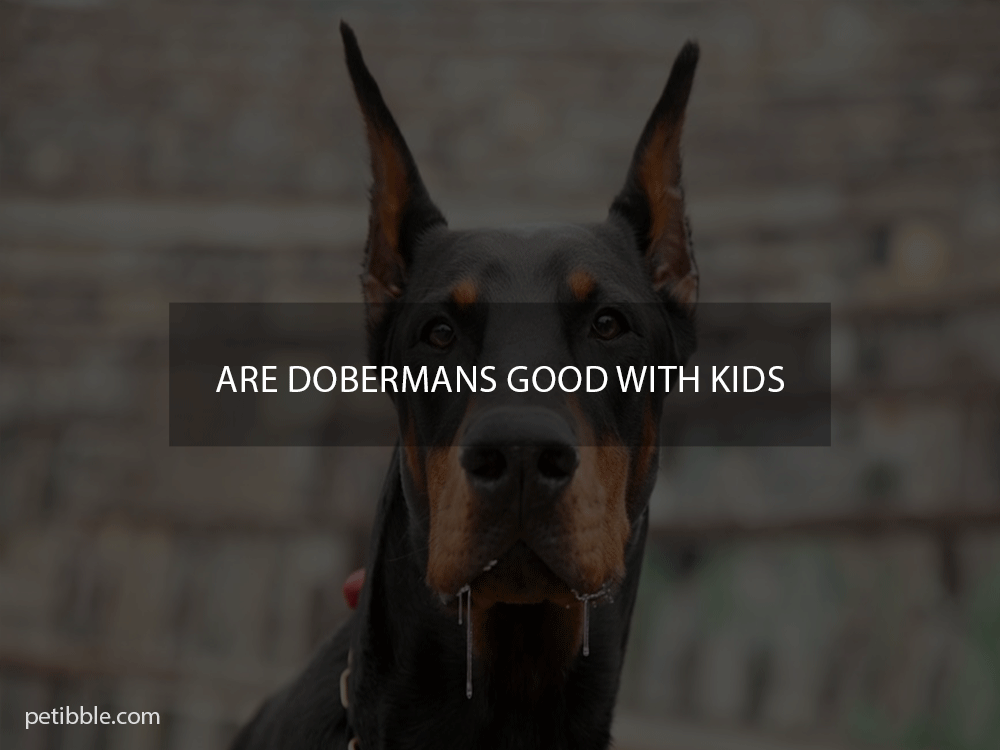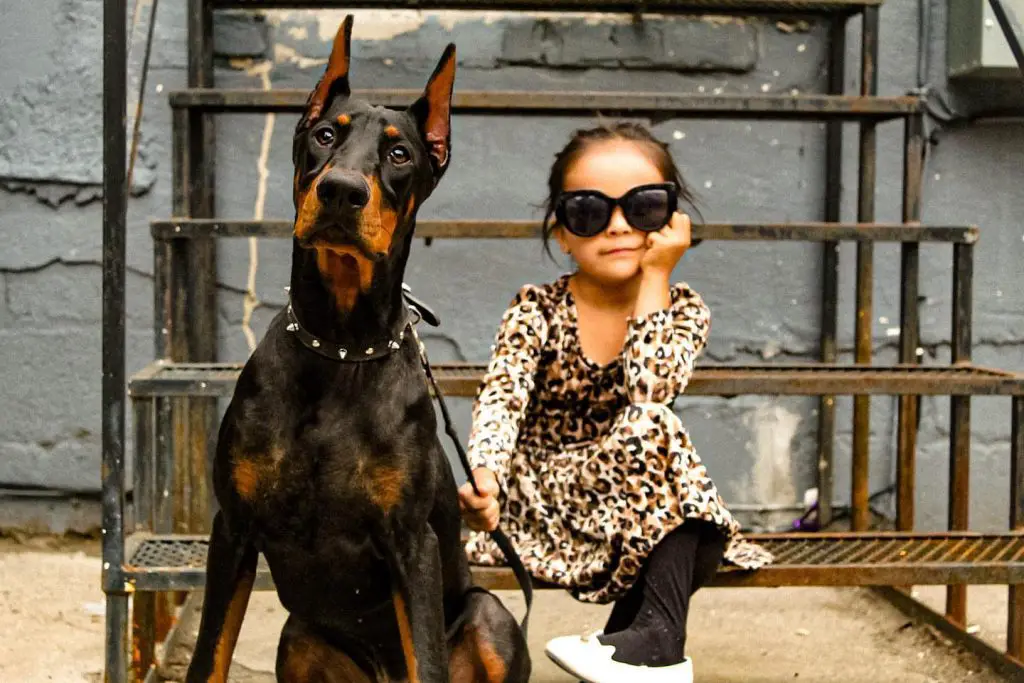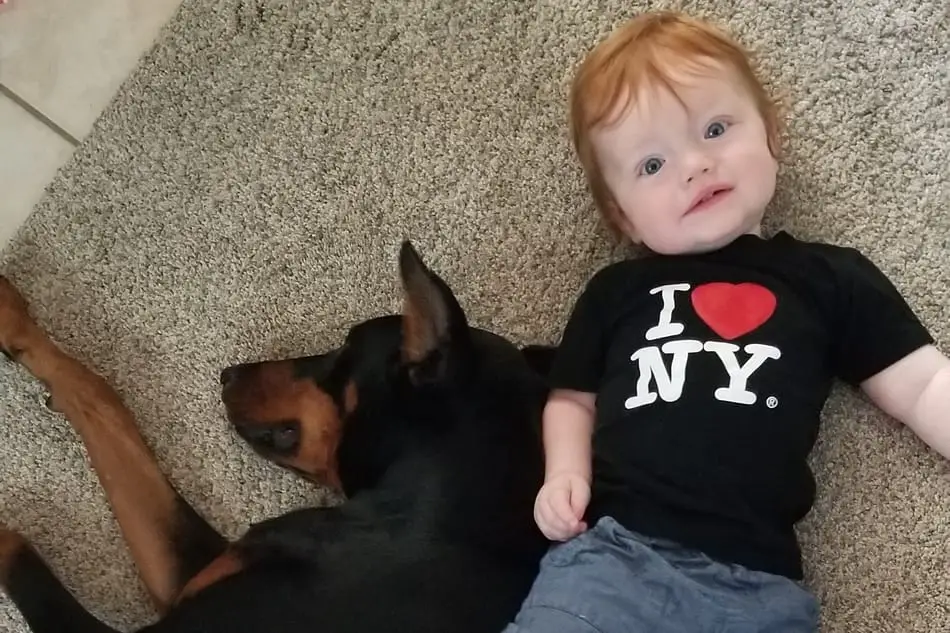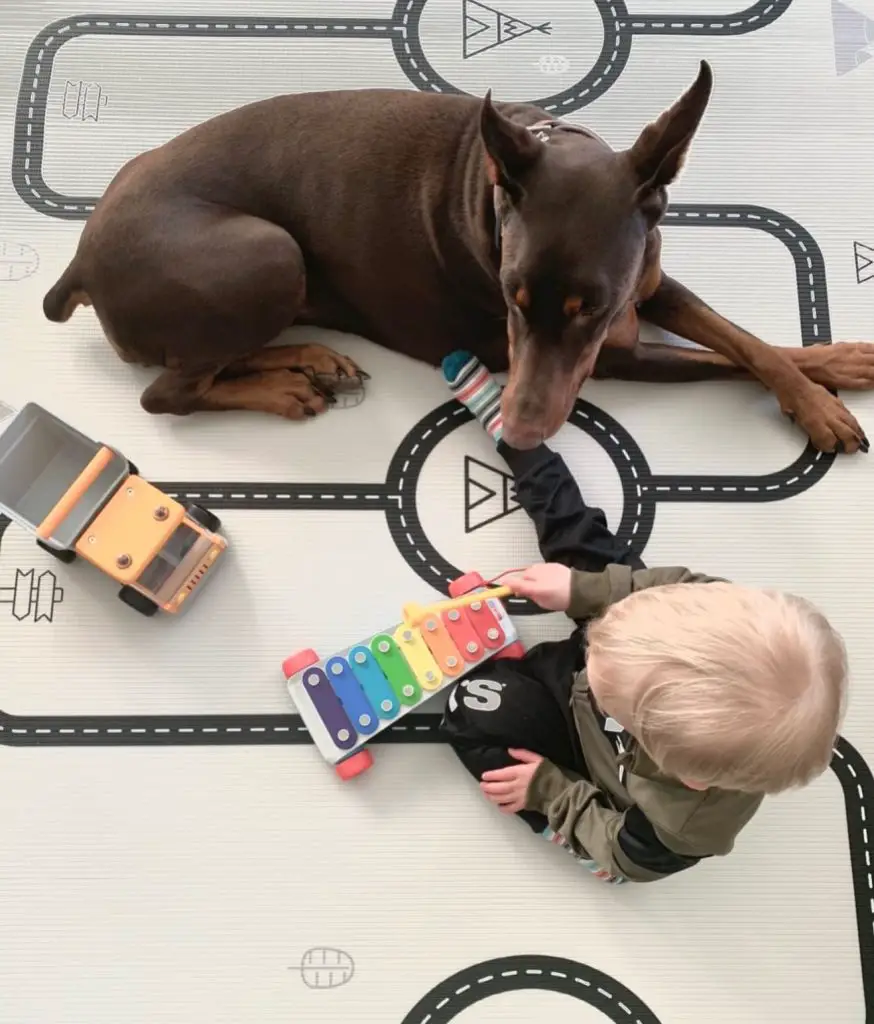Dobermans History.
You may be surprised to learn that Doberman Pinschers were first bred as guard dogs in the 19th century by a German tax collector who was also the breed’s namesake: Karl Friedrich Louis Dobermann. No one knows for certain, but Dobermann is thought to have crossed many breeds to get the Doberman pinscher. Some of the breeds thought to be involved include the rottweiler, German pinscher, Great Dane, German shepherd dog, Manchester terrier, Belgian Malinois, and English greyhound shorthaired shepherd. Although initially bred and still used worldwide as guard dogs and excellent working dog’s, Doberman pinschers also have been police dog’s and military dog’s, rescue dog’s, and therapy dog’s.

Dobermans behavior and character.
Temperament can have a significant impact on a Dobe’s behavior around children. While every dog is unique, some traits do not appear to be common in Dobies.
You may like: Black mouth cur lab mix.
Intelligent.
Dobermans are among the most intelligent dog breeds. Training is easier for them than for other breeds. They are quick to pick up on changes in their environment and home life.
Great Playmates.
Dobermans are great companions for your child for many reasons. Dobermans are energetic and need to be exercised a lot. Every day, your Dobie should get at least 2 hours of training. Although you may not walk your dog as often, your children will enjoy playing in the backyard with their Dobie.

Excellent guard dog.
Your Doberman is a member of your family and will be protective of your children. Doberman guardianship will make your family feel more secure if you are thinking about installing a security system in your home. It is crucial that your Doberman be socialized and trained early in his life. Dogs may mistake roughhousing with children or relatives as a threat to their safety. It is important for them to understand that other members of the family are part of your “pack” and they are a good family dog for them.
Loyal.
The Doberman breed is one of the most loyal dog breeds. They will usually attach themselves to only one person in a family, often the one who is most involved in their care. They can become jealous or anxious if they are being interacting with multiple people.
Protective.
Dobermans, especially males, are extremely protective of their family members and can be aggressive towards strangers who try to enter their homes. Dobermans should be introduced to new people and other animals with caution, preferably under supervision.
You may like: how to get a scared dog to trust you?
Dobermans and Kids.
Dobermans are intelligent, loyal, protective, and highly intelligent. What if you have children?
Doberman Pinschers can be great with children if they are socialized and trained properly. Doberman Pinschers are family-oriented and have strong protective instincts, which makes it easy to form close bonds with their canine and human family members.
Female Doberman is more open to toddlers and infants than their male counterparts. Because they are smaller than larger dogs, it is thought that they may not see small children the same way a larger dog might. They tend to be more patient and less likely to become upset when children make noise and run around.
Male Doberman can also be protective of children. They will follow their owners from room to room like they were kittens or puppies. Some dogs are so attached to children that they won’t go outside to play with their families.
Dobermans can be good with children, but there are some things you need to know before purchasing a Dobie. If you have young children, a female Doberman may be a better option. A male Doberman is better if you have older children.

A Doberman puppy and a human child are not a good combination.
Doberman Pinscher Club of America advises against combining Doberman puppies with young children. If you have children under the age of three, it is not a good idea for them to adopt a Doberman puppy. Young Doberman puppies are high-energy bundles with sharp teeth and toenails. A small child can be terrified of nipping dogs, and puppies can become scared from screaming, running children.
Parents may have to discipline their puppy for good behavior. This creates a bad environment for the toddler or child and the puppy. It can also lead to major behavior problems. Because the children are afraid, the puppy ends up in the basement or garage. The puppy then grows up without any family socialization and fear of the adults.
You may like : Can dogs eat pop tarts?
Possible Issues with Dobermans and Kids?
Dobermans are great pets for children. However, there are some things you should consider before you bring one home. These are some of the issues:
Barking issue.
Dobermans are known for their loud, deep barks that can be heard far away. If children are young and not used to dogs, this can cause anxiety.
Potential Aggression.
Dobermans aren’t usually aggressive dogs but can become so if they feel unsafe or unhappy in their environment. Problems can arise from a new baby, an unfriendly pet, or a change of routine. A professional trainer should be contacted immediately if a Doberman shows aggression signs.
Jealousy.
Dobermans are very jealous of their family’s attention and can get agitated when they see multiple people. Children who spend a lot of time with their dog, especially younger ones or those who are more active, might experience this behavior.

Conclusion.
Dobermans are known for being loyal and protective dogs. However, they can also be great companions for older children. There are many pros and cons to Dobermans as well as kids. Proper training for both children and Doberman’s will be necessary. As a Doberman own, only you can decide what is best for you. Do your research. You must be willing to train the dog as well as socialize it early in life.





